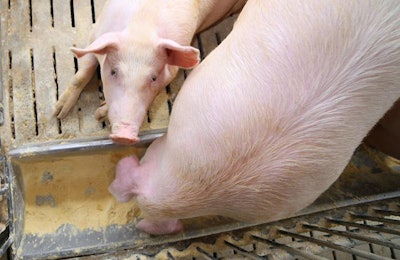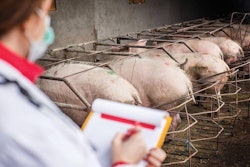
While African swine fever (ASF) has been confirmed among pig herds in Poland and Romania, the disease has also been reported in more wild boar in central and eastern European countries.
After the deaths of seven pigs at a farm in central Romania this month, the presence of the African swine fever (ASF) virus was confirmed. The rest of the herd — almost 2,300 pigs — was destined for culling at the time of the official report to the World Organisation for Animal Health (OIE).
As well as the farm outbreak, the Romanian veterinary authority outlined ASF cases among backyard herds that ranged from two to 40 pigs. As a result of the disease, Romania has lost a further 2,447 pigs through mortality or culling.
2 new outbreaks confirmed in Polish domestic pigs
According to Poland’s chief veterinary officer, there have been four ASF outbreaks among domestic pigs in the country so far this year. These include cases at two new premises reported this month.
This week, the infection was confirmed at a small farm near the town of Ratowice in the central province of Greater Poland (Wielkopolskie). At the farm were 24 pigs, including one sow.
During the first week of June, ASF had been confirmed in a herd of 70 domestic pigs in Wlodawa, which is in Lublin province in eastern Poland. Located very near to the border with Belarus, the premises reared rare breed Mangalica pigs.
Usual procedures to eradicate the disease were initiated at and around both premises, according to these reports.
Poland’s two previous ASF outbreaks in domestic pigs this year were in the provinces of Lubusz and Greater Poland. The former — a breeder farm in the west of the country — was the location of the primary outbreak, from which the second farm became infected through the purchase of pigs.
During 2019, there were 48 ASF outbreaks in Polish pigs, according to the European Commission (EC) Animal Disease Notification System (ADNS).
General ASF situation in European pigs
Up to June 14, the EC-ADNS had recorded a total of 311 ASF outbreaks in domestic pigs in Europe so far this year.
As there was no report last week, this represents an increase of 20 from the previous report, dated June 2. Romania accounted for 18 of these latest outbreaks, and there was one each in Poland and Ukraine.
From this source, by far the worst affected country in Europe so far this year has been Romania (280 outbreaks). Also reporting cases in 2020 have been Bulgaria (17 outbreaks), Ukraine (8), Poland (3), as well as Greece, Lithuania and Moldova, each with one outbreak.
Four European states report ASF in more wild boar
Reporting to the OIE new cases of ASF among their respective wild boar populations over the past week were Poland (151 cases), Hungary (119), Romania (11) and Latvia (9).
All of the Polish cases were located in eastern provinces where there had been previous outbreaks, and over the period January 25 to February 26. For the other states, the outbreaks were recent, occurring since late May.
Europe’s count of ASF cases in wild boar so far this year has reached 6,679, according to the EC-ADNS system.
This is 217 more wild boar than the total of two weeks ago, and includes 104 new cases in Poland and 56 in Hungary.
At 2,699 and 2,641, respectively, Hungary and Poland have reported the highest number of infected animals since the start of 2020.
Other countries that have reported significant numbers of ASF-infected wild boar to the EC this year are Romania (516 cases), Bulgaria (329), Latvia (129), Slovakia (121) and Lithuania (110). Also reporting new cases over the past month were Estonia and Moldova. Their totals this year now stand at 24 and 30, respectively.
View our continuing coverage of the global African swine fever situation.
















